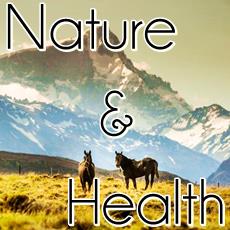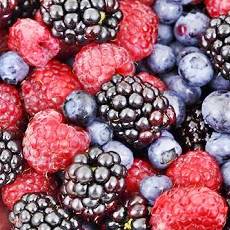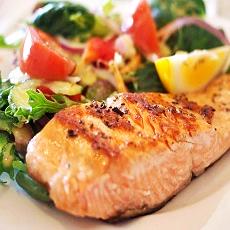Berries are great for your health
Berries, a power food loaded with antioxidants
First published: 04.Jan.2019
Berries are a natural food packed with phytochemicals called flavonoids that are very potent antioxidants.
These natural antioxidants neutralize the free radicals generated by stress, unhealthy lifestyle, and environmental factors.
You can easily incorporate berries into your diet and benefit from their anti-inflammatory and antioxidant properties every day. They are also a good source of fiber.
Read the scientific evidence and learn why berries are so good for you and what health benefits they provide.
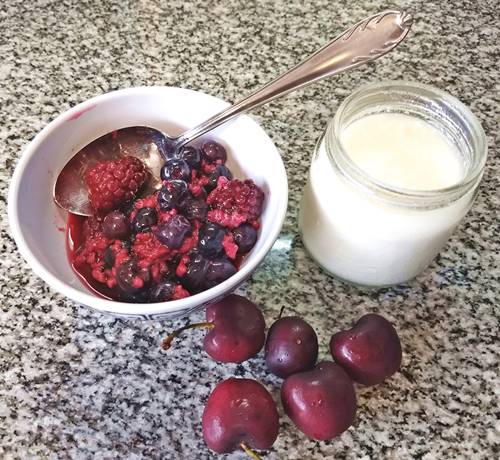
Berries are a natural source of antioxidants
One of the main properties of berries is their potent anti-oxidant effect.
They are a rich source of plant chemicals (phytochemicals) that neutralize free radicals.
The beneficial compounds found in berries include not only vitamin C but also phenolic compounds known as polyphenols. There are over 8,000 different polyphenols (flavonoids, phenolic acids, tannins, stilbenes, and diferuloylmethanes).
The key ingredient in berries are the polyphenols called flavonoids that encompass powerful antioxidant chemicals called "anthocyanins."
Anthocyanins
The word Anthocyanin comes from the Greek words "anthos" (flower) and "kyanous" (dark blue"). Anthocyanins are the pigments that give berries their red, blue, and purple tint.
All of these phytochemicals have anti-oxidant and anti-inflammatory properties.
But, what are anti-oxidant compounds? And what do they do?
Free Radicals
Free radicals are also known as "reactive oxygen species" (or ROS). They are chemicals produced naturally by your body during its normal day-to-day metabolic processes.
External factors such as air pollutants, UV radiation from the sun, smoking, alcohol, industrial chemicals, and agrochemicals also trigger the production of free radicals.
The Dangers of Free Radicals
Free Radicals are highly reactive chemical compounds, and their main feature is that they are molecules with "unpaired electrons." Molecules seek stability and require "paired" electrons, so these free radicals snatch an electron from another molecule to become stable. This process is known as "oxidation."
But oxidation causes damage to the second molecule, turning it into a new free radical. This begins a vicious circle of free radicals damaging otherwise stable molecules and converting them into free radicals or ROS.
The whole cycle provokes "oxidative stress" to the body, which reacts with different methods to neutralize free radicals and restore order, and in the process, it becomes inflamed.
The problem arises when these ROS are produced in quantities that overwhelm your body's natural antioxidant mechanisms.
ROS are capable of causing damage to your DNA and the proteins and fats in your cells' walls and their nucleus.
This damage disrupts the way cells work and is harmful to your health.
Antioxidants
As their name indicates, they neutralize the activity and inhibit free radicals, blocking the chain reaction of "oxidation". They do so by "trapping" the ROS or reacting with the chemicals that produce free radicals.
A balanced diet and a healthy lifestyle can minimize the presence of free radicals and enhance the activity of antioxidants.
Antioxidants include compounds such as vitamins (A, E, and C) and also the phytochemicals found in berries: flavonoids and polyphenols.
The inflammation caused by oxidative stress harms human health.
Oxidative Stress
If not strictly controlled with antioxidants, oxidative stress can induce several diseases, both chronic and degenerative, it also speeds up the body's aging process.
Kidney disease, rheumatoid arthritis, cardiovascular disease, and even neurological diseases (dementia, multiple sclerosis, Alzheimer's) and cancer have been linked to oxidative stress (1).
As we will see below, berries are an interesting "natural" source of antioxidants that can help boost your health and counteract the negative health effects of free radicals and oxidative stress.
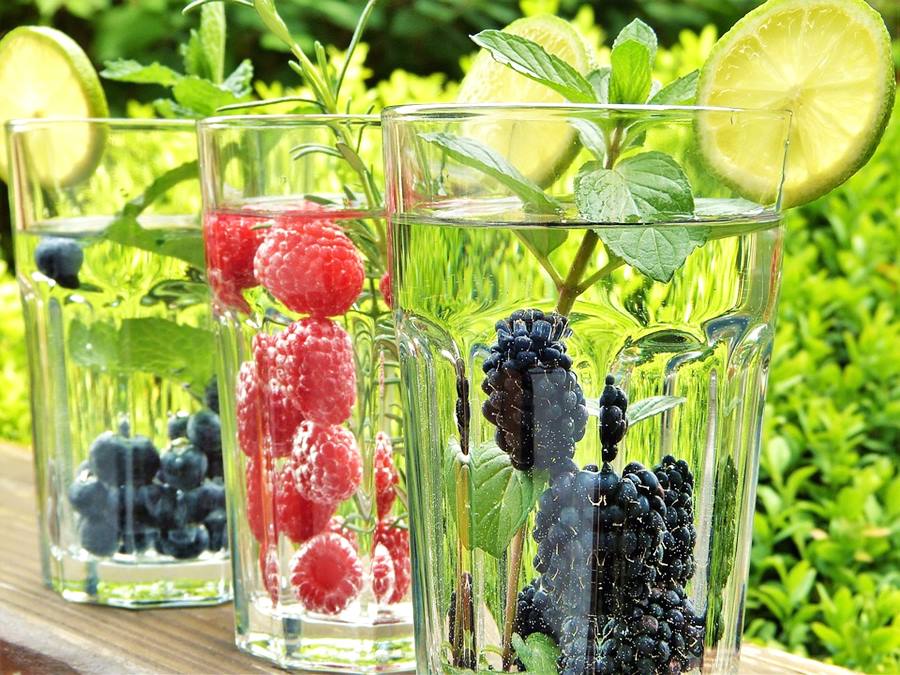
Berries and their health benefits
What is a berry anyway?
Even a child knows what a berry is: a small sweet and fleshy fruit, with seeds, and a color that ranges from red to purple and blue, that can be easily picked off bushes or trees.
But common knowledge and scientific classification don't usually go hand in hand, and berries are a good example.
Botanical classification of berries
A botanist will tell you that a berry is a fruit that develops from a flower that has a single ovary. Its seeds are surrounded by a fleshy pericarp, which consists of three distinct layers: an inner layer, or "endocarp", a middle layer, or "mesocarp" and an outer layer, the "exocarp".
To be a berry, it must have at least two seeds, that is why a cherry with only one seed or pip is not considered a berry by botanists, instead, it is a drupe.
Based on this classification, strawberries, raspberries, and blackberries aren't berries either but a banana, an eggplant, the kiwi fruit, tomatoes, and even citrus such as oranges and lemons are all berries.
In the case of bananas and oranges (as well as watermelons) the exocarp is tough and not edible.
Strawberries and raspberries don't make the berry cut because they come from flowers that have more than one ovary, and each ovary produces a small "druplet", each one with its seed. These druplets combine to form an aggregate fruit: like a strawberry or a blackberry.
But, for this article, and the scientific papers cited in it, berries are in fact what we all consider them to be: small juicy red - purple - dark blue fruits belonging to many different families of plants.
- Rosaceae: such as the black chokeberry (Aronia melanocarpa), strawberry (Fragaria ananassa), red raspberry (Rubus ideaus), black raspberry (Rubus occidentalis), blackberry (Rubus fruticosus), cherry (Prunus sp.), and cloudberry (Rubus chamaemorus).
- Ericaceae: which include the cranberry (Vaccinium macrocarpon), bilberry (Vaccinium myritillus), lowbush blueberry (Vaccinium angustifolium), highbush blueberry (Vaccinium corymbosum)
- Other families: blackcurrants (Ribes nigrum - family: Grossulariaceae), sea buckthorn (Elaeagnus rhamnoides - family: Elaeagnaceae) and grapes (Vitis - family: Vitaceae), mulberry (Morus sp. - family: Moraceae), maqui or Chilean wineberry (Aristotelia chilensis - family: Elaeocarpaceae).

Having clarified the classification of berries, let's look into their healthy properties.
Cherries
A review of scientific studies regarding the health benefits of cherries (2) found that consuming them reduced oxidative stress, inflammation, exercise-induced muscle soreness (exercise generates free radicals), and blood pressure.
Cherries also improved sleep, relieving arthritis, and decreased "bad" cholesterol (LDL) and triglycerides in diabetic women and obese subjects.
Furthermore, some studies showed that cherry consumption was beneficial for diabetes, cognitive functions, and mood.
However, these benefits were reported in studies that used very large and unrealistic doses of cherries (equivalent to eating between 45 and 270 cherries per day).
Blueberries
The high content of anthocyanins makes blueberries great for promoting eye health according to a study by Huang et al. (2018) (3).
They found that the antioxidant and anti-inflammatory properties of blueberries protected the retinal capillary endothelial cells from damage caused by high levels of glucose in patients suffering from diabetic retinopathy.
Blackberry feeding significantly increased fat oxidation and insulin sensitivity in overweight or obese men. Solverson et al. (2018) (4)
Excellent Source of Fiber and Vitamin C
Blueberries are also a good source of dietary fiber (roughly 3.5% content). Four ounces of blueberries provide, on average, 10 mg of Vitamin C, equal to 1⁄3 of the daily recommended intake (5).
This fiber plus the Vitamin C effect is found in all berries, as you can see in the following table.
Fiber and Vitamin C content per 100 grams of raw fruit
Strawberry
2.0 g fiber - 58.8 mg Vitamin C
Blackberry
5.3 g fiber - 21.0 mg Vitamin C
Raspberry
6.5 g fiber - 26.2 mg Vitamin C
Cranberry
3.6 g fiber - 14.0 mg Vitamin C
Cherry
2.1 g fiber - 7.0 mg Vitamin C
Mulberry
1.7 g fiber - 36.4 mg Vitamin C
Source: National Nutrient Database for Standard Reference. Legacy Release, USDA.
Blueberries prevent diabetes and cardiovascular disease
Kalt et al. (2020) reported that "regular, moderate intake of blueberries and⁄or anthocyanins with reduced risk of cardiovascular disease, death, and type 2 diabetes, and with improved weight maintenance and neuroprotection."
Their anti-inflammatory and antioxidant content has "beneficial effects on vascular and glucoregulatory function." and may have a positive impact on the gut microbiota (6).
Blackberries
Solverson et al. (2018) studied 27 overweight and obese men and found that eating 600 grams per day (1.3 pounds) of blackberries -equivalent to 1,500 mg⁄day of flavonoids- increased fat oxidation and insulin sensitivity (4).
Fat oxidation means that your body is using fat as fuel and "burning" it in the cells' powerhouses, the mitochondria. By burning fat, you lose weight.
Improving insulin sensitivity reduces the risk of developing type 2 diabetes.
Blackcurrants
Gopalan et al. (2012) (7) described the properties of blackcurrant anthocyanins (such as delphinidin-3-O-glucoside, delphinidin-3-O-rutinoside, cyanidin-3-O-glucoside, and cyanidin-3-O-rutinoside), phenolic acids, and flavonols.
They reported that it had positive effects in treating diabetes, high blood pressure, and cardiovascular, eye, kidney, and neurodegenerative diseases.

Mulberries
Mulberries contain alkaloids and flavonoids both of them are antioxidants. Anthocyanins are the main compound found in mulberries. They have anti-obesity, anti-cholesterol properties, and also help protect the liver (Zhang et al., 2018) (8).
Cancer and Berries, a protective effect
A review by Kristo, Klimis-Zacasa, and Sikalidis (2016) (9) on the protective effects of berries against cancer found that the antioxidant properties of berries protect DNA from damage and also regulate the growth -or proliferation rates of malignant and premalignant cells (this is known as apoptosis).
By acting upon premalignant cells and causing them to regress, they help prevent the onset of cancer and even delay its progression into full-blown cancer.
The exact mode of action is not yet clear, but some pathways by which antioxidants found in edible berries act upon cancer have been identified.
The authors concluded that: "Edible berries have been demonstrated to extend chemoprevention in cancer primarily of the Gastrointestinal tract as well as breast and to a lesser degree of liver, prostate, pancreas and lung."
Additionally, being a natural food, administrated as part of a balanced diet, it has no negative side effects.
Berry administration [is] a plausible and potentially useful dietary strategy to reduce the risk of cancer and help cancer patients with disease prognosis. Kristo et al. (2016)(9)
Include berries in your daily diet
Incorporating natural antioxidants into your diet by adding a handful of berries seems a very sensible choice.
They appear to have a significant effect on many diseases, especially those related to oxidative stress.
Their natural phenolic compounds plus their Vitamin C and fiber content make them ideal as a part of your balanced daily diet.
A wide variety of berries whether fresh or frozen (frozen berries have the same content of polyphenols and vitamins as fresh ones - and are an ideal way to eat them off-season during the long winter months).
Measurement of the antioxidant activity of anthocyanin extracts from blueberries showed there was no significant difference between fresh, dried, and frozen blueberries. Lohachoompol (2004) (10)
As they are natural fruits, they have no toxic side effects and they are a tasty and healthy option for desserts, breakfast, or even part of your salads.
References and Further Reading
(1) Pizzino G, Irrera N, Cucinotta M, et al. (2017). Oxidative Stress: Harms and Benefits for Human Health. Oxid Med Cell Longev. 2017;2017:8416763
(2) Kelley DS, Adkins Y, Laugero KD., (2018). A Review of the Health Benefits of Cherries. Nutrients. 10(3):368. Published 2018 Mar 17. doi:10.3390/nu10030368
(3) Huang W, Yan Z, Li D, Ma Y, Zhou J, Sui Z., (2018). Antioxidant and Anti-Inflammatory Effects of Blueberry Anthocyanins on High Glucose-Induced Human Retinal Capillary Endothelial Cells. Oxid Med Cell Longev. 2018;2018:1862462. Published 2018 Feb 22. doi:10.1155/2018/1862462
(4) Solverson PM, Rumpler WV, Leger JL, et al. (2018). Blackberry Feeding Increases Fat Oxidation and Improves Insulin Sensitivity in Overweight and Obese Males. Nutrients. 2018;10(8):1048. Published 2018 Aug 9. doi:10.3390/nu10081048
(5) Michalska A, Lysiak G, (2015). Bioactive Compounds of Blueberries: Post-Harvest Factors Influencing the Nutritional Value of Products. Int J Mol Sci. 2015;16(8):18642-63. Published 2015 Aug 10. doi:10.3390/ijms160818642
(6) Kalt W, Cassidy A, Howard LR, Krikorian R, Stull AJ, Tremblay F, Zamora-Ros R. (2020) Recent Research on the Health Benefits of Blueberries and Their Anthocyanins. Adv Nutr. 2020 Mar 1;11(2):224-236. doi: 10.1093/advances/nmz065. PMID: 31329250
(7) Ashwin Gopalan et al., (2012). The health benefits of blackcurrants. Issue 8, 2012 Food & Function
(8) Zhang H, Ma ZF, Luo X, Li X, (2018). Effects of Mulberry Fruit (Morus alba L.) Consumption on Health Outcomes: A Mini-Review. Antioxidants (Basel). 2018;7(5):69. Published 2018 May 21. doi:10.3390/antiox7050069
(9) Kristo, A. S., Klimis-Zacas, D., and Sikalidis, A. K. (2016). Protective Role of Dietary Berries in Cancer. Antioxidants (Basel, Switzerland), 5(4), 37. https://doi.org/10.3390/antiox5040037
(10) Virachnee Lohachoompol, George Srzednicki, and John Craske, (2004). The Change of Total Anthocyanins in Blueberries and Their Antioxidant Effect After Drying and Freezing. Journal of Biomedicine and Biotechnology, vol. 2004, no. 5, pp. 248-252
About this Article
The Health Benefits of Berries, A. Whittall
©2018 Fit-and-Well.com, 04.Jan.2019. Updated. 24.Dec.2020. https://www.fit-and-well.com/diet-food/berries-health-benefits.html
Tags: berries, edible berries, blackcurrant, mulberry, cherry, blueberry, blackberry, raspberry, phytochemicals, flavonoids, phenolic compounds, antioxidants, polyphenols, anthocyanins, overweight, obesity, fat oxidation, free radicals, glucose, insulin sensitivity, health, inflammation, oxidative stress, chronic diseases, nutrition, cancer, chemoprevention.
This Webpage
Subject: Fit-and-Well.com. The health benefits of berries. Berries are rich in antioxidants, vitamin C, and fiber; they keep free radicals under control, combat inflammation, and have a positive effect on several chronic disases from cardiovascular, renal, and retinal ailments to diabetes, obesity, neurological diseases, and cancer.



